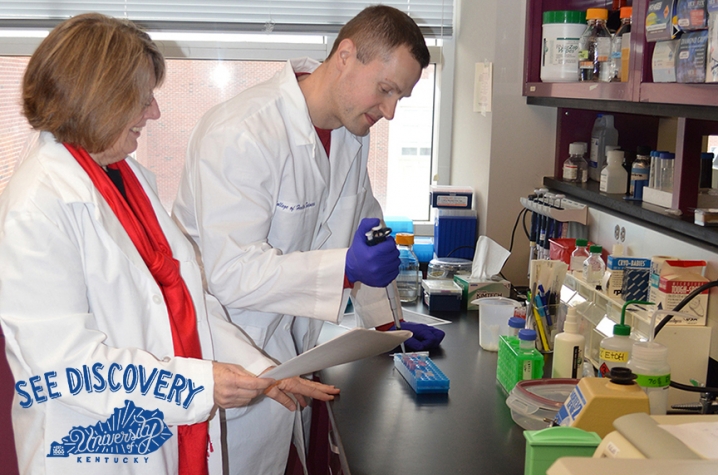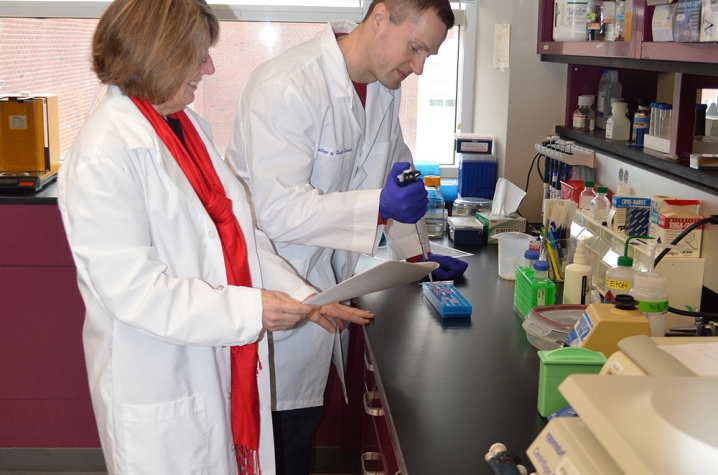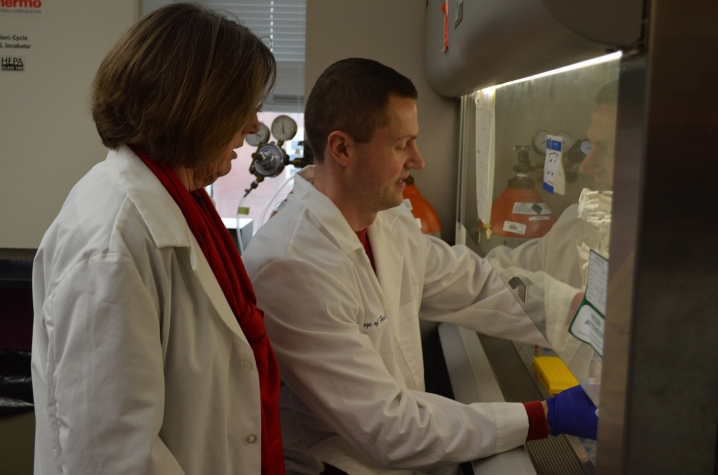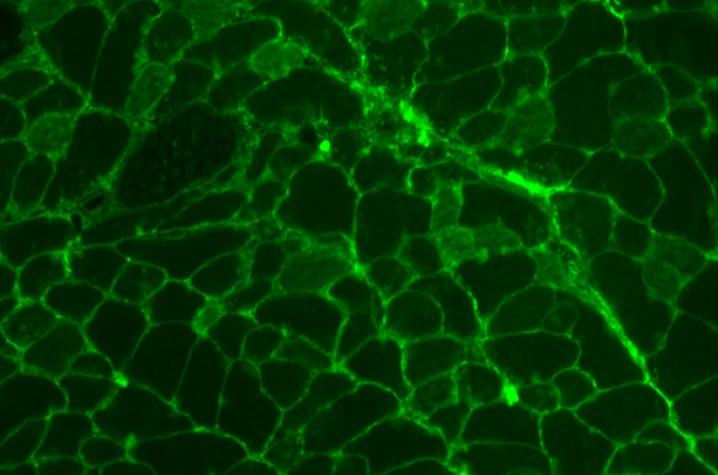UK Study Disputes Previous Theories on Loss of Muscle Stem Cells and Aging
LEXINGTON, Ky. (Jan. 7, 2014) – Professional athletes often spend hours in a gym working to build strong healthy muscles needed to keep them at the top of their game. But strong muscles help all humans maintain peak physical performance – the non-athlete, the young and the old – and can prevent frailty later in life, a condition that can exacerbate an illness and even shorten one's life. According to Charlotte Peterson, co-director of the Center for Muscle Biology at the University of Kentucky, "muscle powers health."
Peterson, who is also a professor and associate dean for research in the College of Health Sciences and associate director of the UK Center for Clinical and Translation Science (CCTS), has spent her career studying muscle structure and function at the cellular and molecular level, and the changes that occur with age with the long-term goal of preventing frailty to maintain functional independence. She says muscles have always fascinated her because they are very adaptive, clinically relevant, and an accessible organ system to study.
The literature on aging research, particularly muscle aging, postulates a strong correlation between the loss and/or dysfunction of muscle stem cells and sarcopenia, the scientific term for the age-related loss of skeletal muscle mass and strength. Despite the correlation, no studies have directly tested this relationship to determine if the loss of muscle stem cells actually causes sarcopenia, although Peterson says that assumption has almost become dogma in the field of aging research.
Sarcopenia affects millions of aging adults. Age-related loss of muscle mass and strength not only robs elderly people of the ability to perform even the most basic tasks of daily living, but also significantly increases their risk of suffering devastating injuries and even death from sudden falls and other accidents. Studies show that people lose one percent muscle mass per year beginning around the age of 50. Although weight-lifting (resistance) exercise can help to maintain and increase muscle mass, as humans age, muscles become less responsive to exercise.
Currently entire research programs are focused on developing muscle stem cell therapy to delay, prevent or even reverse sarcopenia. In light of Peterson's current study published in the December issue of Nature Medicine, researchers will no doubt reconsider previous theories.
Peterson's lab, in collaboration with John McCarthy in the Department of Physiology at UK, developed an animal model that allowed them to deplete young adult muscle of stem cells to a level sufficient to impair muscle regeneration throughout the life of a mouse. They expected the mouse to be a model of premature muscle aging.
"To our surprise, the mice aged normally; life-long depletion of skeletal muscle stem cells did not accelerate nor exacerbate sarcopenia," Peterson said. "Nature Medicine published our 'negative results' which show a clear distinction between therapeutic strategies that may effectively treat degenerative myopathies, such as dystrophies and cachexia, versus sarcopenia. While degenerative conditions are expected to benefit from a stem cell-based therapy, this does not appear to be a viable approach for treating age-associated muscle wasting. Hopefully, our work will help to refocus aging muscle research on new therapeutic targets to effectively maintain muscle function and prevent frailty in the elderly."
Chris Fry, Ph.D., former postdoctoral fellow in Peterson’s lab, and current assistant professor at the University of Texas Medical Branch, is first author of the study. He adds that “the loss of muscle mass and function was unaffected by the depletion of stem cells in our model. Our results challenge years of correlative findings that emphasized the role of stem cells during aging and will hopefully spur scientists into pursuing new lines of research aimed at attenuating sarcopenia.”
Peterson heads a multi-million dollar research program at UK funded by the NIH that includes a wet lab, where biochemical muscle analyses are performed, and the recently established Human Performance Lab, where physical functional assessments and exercise training studies are conducted. Other researchers in the College of Health Sciences also study muscle biology related to a wide range of functions. Esther Dupont-Versteegden, co-author on the Nature Medicine publication, studies muscle wasting due to disuse and inactivity and, together with Tim Butterfield, is funded to determine the mechanisms underlying the beneficial effects massage. Joe Stemple’s work is focused on laryngeal muscles controlling voice production, which become compromised with age, as well as due to strain in professional singers.
Informed by her work in animal models, and concerned by the poor response to exercise in many older people, Peterson began to explore other aspects of muscle to identify new targets to help to maintain and increase mass and strength. She noted that the abundance of an immune cell type, called a macrophage, in muscle predicted how well individuals responded to exercise.
These preliminary findings formed the basis of a newly funded exercise training study in the elderly designed to augment macrophages in muscle to improve the overall response to resistance training. This is a collaborative project with Philip Kern in the College of Medicine, and director of the UK CCTS, and Marcas Bamman at the University of Alabama, Birmingham.
For more information about the study, go to http://www.uab.edu/medicine/exercise/research/current-studies/masters-trial
Peterson joined the faculty at the UK College of Health Sciences in 2006. She was previously professor of Geriatrics at the University of Arkansas for Medical Sciences, where she served for 16 years. Peterson received her Bachelor of Science degree at the University of Notre Dame and her doctorate from the University of Virginia, followed by two postdoctoral fellowships, the first at the National Eye Institute at the NIH and the second at Stanford University School of Medicine. Peterson is an associate editor of the Journals of Gerontology and was recently appointed to the National Institute on Aging Board of Scientific Counselors.
Media Contact: Ann Blackford at 859-323-6442 or ann.blackford@uky.edu









